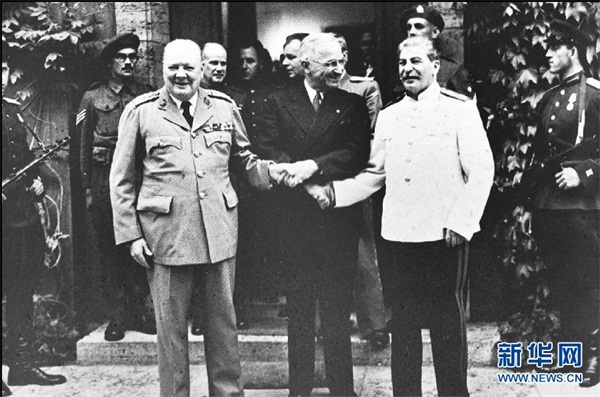 |
|
File photo shows Winston Churchill (L), Harry S. Truman (C) and Joseph Stalin (R) at the Potsdam Conference in July 1945. The Potsdam Declaration, which outlined the terms of surrender for Japan during World War II in Asia, was issued on July 26, 1945. [Source: xinhuanet.com/photo] |
Seventy years ago, when the United States, Great Britain and China released the Potsdam Declaration on 26 July 1945 ordering the unconditional surrender of Japan, the content of the document was not taken seriously enough in Japan.
Nor is it today.
The document is largely unmentioned in Japan, where Shinzo Abe and die-hard rightists are colluding to rewrite their country's pacifist Constitution and unfetter the country's long-suppressed military potential.
This should not be the case, because it holds the key to resolving many of the troubles haunting present-day East Asia.
The document is explicit about the nature of the Japan-launched war and demands the eradication of militarism, the trial of war criminals, and the establishment of a "peacefully inclined and responsible government" in Japan.
Abe, however, has questioned the legitimacy of the International Military Tribunal for the Far East, repeatedly defied international appeals for him to stop paying homage to the Yasukuni Shrine, where, among others, Class-A convicted war criminals are enshrined, and refuses to acknowledge that his country waged a war of aggression.
And he unashamedly refuses to acknowledge the Potsdam Declaration, which may sound unimaginable for the head of a country thirsty for international acceptance as a "normal country".
But perhaps his aversion to the document is understandable since it is the legal basis for the prosecution of Japanese war criminals, including his grandfather and political mentor Kishi Nobusuke, who, although convicted as a Class-A war criminal, spearheaded post-war Japan's initial rightist turn.
It also requires Japan to return the territories it had stolen during the war, including islands in the East and South China Seas, and limits Japanese sovereignty to islands designated by the victorious powers.
In other words, it renders many of Abe's claims regarding history invalid and illicit.
Japan has a legal obligation to abide by its commitment to the Potsdam Declaration.
If Abe has any questions about that obligation, there are plenty of other historical documents aside from the Potsdam Declaration he can refer to: from the Instrument of Surrender and the Imperial Rescript on the Termination of the War by Emperor Hirohito, to the 1972 China-Japan Joint Communiqué, the 1978 China-Japan Peace and Friendship Treaty, and the 2008 China-Japan Joint Declaration on Promoting Strategically Mutual-Beneficial Relations in An All-round Manner.
All of them state in unequivocal terms Japan's acceptance of the Potsdam Declaration.
And Article 98 of the Japanese constitution pledges "The treaties concluded by Japan and established laws of nations shall be faithfully observed," at the core of which is the Potsdam Declaration.